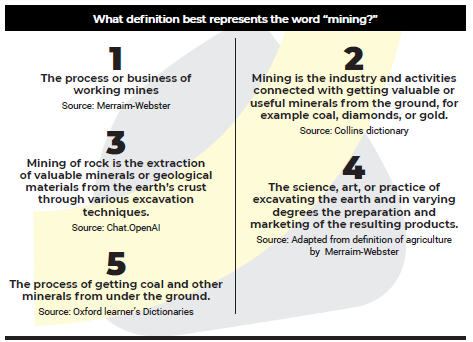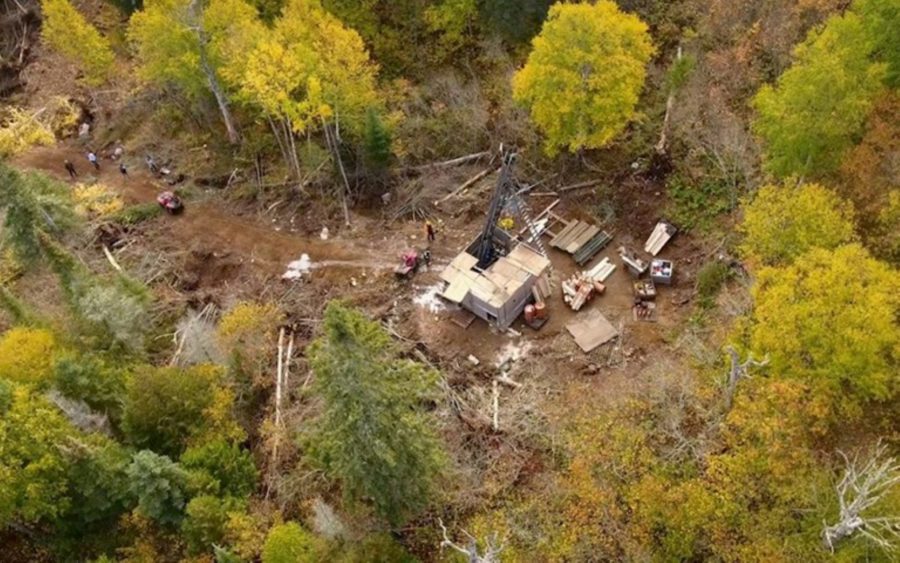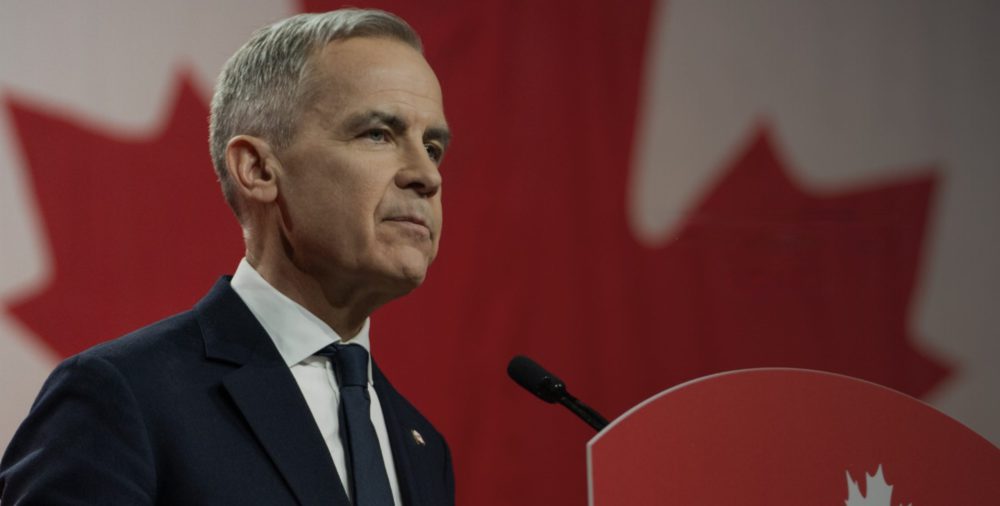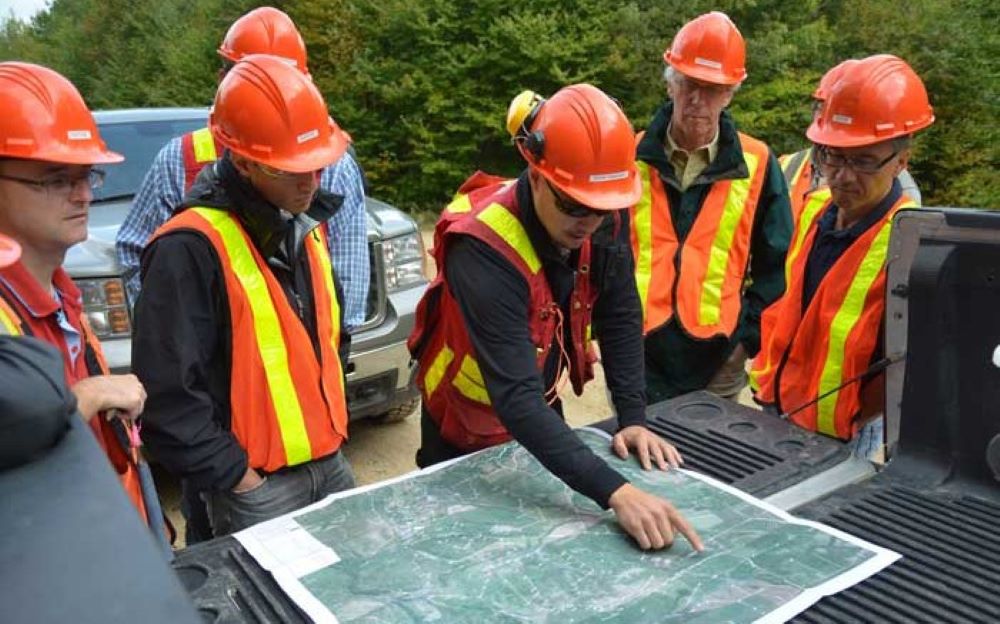Crafting a fresh definition for modern mining

In February 2023, McKinsey and Company printed an article entitled “Has mining lost its luster? Why talent is moving elsewhere and how to bring them back.” The report outlines the challenges facing the mining industry in its recruitment of new, young talent, especially in the “specialized fields of mine planning, process engineering, and digital data (data science and automation)” (2023). Along with four areas of intervention the report advises upon, it also suggests that the mining industry needs to examine how it defines its core needs. For example, McKinsey and Company say, “The mining industry sometimes struggles with defining ‘capability’ too narrowly, focusing predominantly on role-specific technical competence” (2023).
The report invites the mining industry to consider a “more holistic definition of ‘capability’ should be used, [which includes] leadership skills, broader business awareness, cross-functional expertise, and digital savviness” (2023). Chair of the Australian Academy of Sciences National Committee of the Earth Sciences, commenting on lower enrollment trends in geoscience, says this trend suggests that “governments and the broader public are insuffienctly aware of the vital role of geoscience in understanding the broad interface between humans and our planet, including pressing concerns about changing climate, scarce sub-surface water resources, and the emerging need for critical metals for our decarbonized future” (Lismore-Scott, 2023). Like McKinsey and Company, we suggest that the mining industry should define itself more accurately if it wants to increase talent recruitment.
The authors compared definitions of mining in online dictionaries and discovered that based on dictionary definitions, the industry looks unimpressive, basic, and possibly even unappealing. For example,
> The process or business of working mines.
Source: Merriam-Webster (https://www.merriam-webster.com/dictionary/mining)
> The process of getting coal and other minerals from under the ground.
Source: Oxford Learner’s Dictionaries (https://www.oxfordlearnersdictionaries.com/definition/english/mining?q=mining)
> Mining is the industry and activities connected with getting valuable or useful minerals from the ground, for example coal, diamonds, or gold.
Source: Collins Dictionary (https://www.collinsdictionary.com/dictionary/english/mining)
Based on these definitions, mining seems to be an industry that is narrowly focused on excavation and digging which may be perceived as uninteresting. We checked with Chat.OpenAI to see if it may reveal something more broad and received this suggestion for a definition:
> Mining of rock is the extraction of valuable mineral or geological materials from the earth’s crust through various excavation techniques.
Source: Chat.OpenAI (https://chat.openai.com/)
This definition is a similarly limited because it still does not capture the entire essence or significance of mining. All human material needs are met in one of two ways: through agricultural work or through mining. This phrase suggests a natural relationship between mining and agriculture; however, the capaciousness of the definition for mining is absent from the most basic place we go to learn the meaning of words. In scouring dictionaries to see how agriculture is defined, we found this definition of agriculture in Merriam-Webster:
> Agriculture is the science, art, or practice of cultivating the soil, producing corps, and raising livestock and in varying degrees the preparation and marketing of the resulting products.
Source: Merriam-Webster (https://www.merriam-webster.com/dictionary/agriculture)
In adapting that definition, we suggest that a more meaningful definition of mining is
> The science, art, or practice of excavating the earth and in varying degrees the preparation and marketing of the resulting products. Similarly, then the definition of ‘mine’ can be modified to provide further clarification and detail about the applications of a word’s primary meaning. In the Merriam-Webster on-line dictionary, the current definition is:
Mine
- a pit or excavation in the earth from
which mineral substances are taken - an ore deposit
Definitions often include sense extensions that provide further clarification and detail about the applications of a word’s primary meaning. Deciding what Beneteau considered to be a mine was one of the challenges in creating the historical Mines Hub that can be accessed at https://www.cim.org/the-hub/. Considering the types of resources included to-date, we suggest the definition for “a mine” could be as follows:
Mine noun
- a location from which various valuable resources are extracted from the earth
- an ore or mineral deposit, underground or on surface
- solution mine
- lake sediment
- quarry, trench or pit
- wells including oil, petroleum, and water
- placer deposits
- trenches
- field stones
- geothermal energy
- tailings that are reprocessed
Definitions matter. They provide clarity and a common framework for effective communication and common understanding. Proper definitions for the mining industry could be a subtle way of making the industry more attractive so that the “talent squeeze” discussed by McKinsey and Company could be improved. Mining is viewed as the least attractive industry to young talent (aged 15 to 30) in the sectors including oil and gas, construction, manufacturing, transportation and logistics, financial services, arts and culture, high tech, and healthcare according to their survey. However as pointed out in Deloitte’s Tracking the Trends 2023 report (page 17/71), the mining industry has a “foundational role as a provider of raw materials” for the creation of low-carbon future.
The hopes of the authors are to engage the mining industry in creating a definition that represents what we do. With enough written evidence, perhaps we can convince lexicographers to update the definitions. With feedback from experts in mining, we can create a move towards updating the definition of mining. We need to provide arguments for the proposed improvement. To provide this evidence we need to start using the words “mining” and “mine” as they apply to the industry to demonstrate how mining is crucial for a sustainable future.
Geologists, engineers, and scientists working in the industry prove that mining needs people trained in science-based fields. It is an art to excavate the earth. The earth exhibits a remarkable level of variability, and no matter how much effort we put into modelling to attempt to understand our resources and reserves, we will never know what is there until we excavate the rock. Various factors such as seismic events, rockfalls, fluctuating ore grades, shifting chemistry, and more contribute to this unpredictability.
Finally, every single one of our products must be marketed. It may be the raw resource we can send right to market like gravel, or the product may require processing such as to remove and concentrate base metals or gold. Mining has been practiced for thousands of years. Throughout history, mining technologies and techniques have evolved, as well as the skillsets of those doing the excavations. As the McKinsey report notes, new “talent” has new needs: a fuller definition of mining that reflects its 21st century role might help the industry in its recruitment. Increased productivity and safety brought significant advancements to mining equipment and skills. Mining is crucial to the global economy as we provide the raw materials that fuel the economy, including those for the transition to a green economy. Ultimately, somebody’s first perception of the industry may be through a simple dictionary definition. Please join the discussion and help shape the narrative of what modern mining is.
Donna Beneteau, PEng, MASc, is an assistant professor at the Department of Civil, Geological, and Environmental Engineering at the University of Saskatchewan (USask).
Jeanie Wills, PhD, is Seaman Chair in Technical and Professional Communication and Associate Professor, USask Ron and Jane Graham School of Professional Development.
The authors acknowledge the contribution of Heather Ecobichon in creating the graphics.





Comments